Clifford Garstang's Blog, page 87
January 28, 2013
The New Yorker: “Zusya on the Roof” by Nicole Krauss
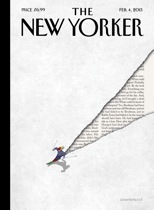 February 4, 2013: “Zusya on the Roof” by Nicole Krauss
February 4, 2013: “Zusya on the Roof” by Nicole Krauss
I don’t think there’s any need to wrestle with the meaning of this story—the author spells it out nicely in the Q&A with Nicole Krauss. Basically, it’s about the “burden of emotional inheritance” in the Jewish religious tradition, which in some ways is not all that different from any other religious tradition. The theme is revealed through the story of Brodman, an old Jewish scholar who is considering the question in the face of his own nearly fatal illness. As he recovers, he witnesses the birth of his grandson, who will continue the inheritance. The story is somewhat enriched by Brodman’s interactions with his wife and daughters, who all have different views on these subjects.
So the theme is interesting and the story is worth rereading because of it. But what do we think of the structure? There’s lots of backstory here that slows us down. Way down. He’s in the hospital, but we have to hear about his father and mother and then also about his relationships with his daughters. These things are important to the theme, though, so perhaps it was necessary for Krauss to go backward in this way.
I found the ending to be . . . frightening, and something of a surprise. A strong ending, I thought.
January 27, 2013
Work in Progress: a new novel
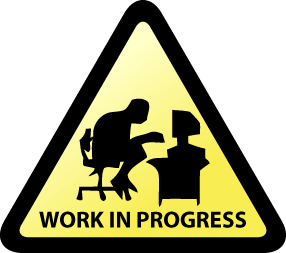 As I continue the process of searching for an agent/publisher for my completed novel (a few agents are looking at it currently), I am also moving on, which is the only thing within my control.
As I continue the process of searching for an agent/publisher for my completed novel (a few agents are looking at it currently), I am also moving on, which is the only thing within my control.
The new project is another novel and it’s a little on the complex side because it involves two separate stories in two distinct time periods. Think Michael Cunningham’s The Hours (which I read recently) or Geraldine Brooks’s People of the Book (which I read last year). Whether I have the skill to pull it off is another question, and it’s the main reason that I hesitated to move forward on this project, which I actually started in late 2011. While it’s clear that these split modern/historical story lines can work–both of the books I mentioned won numerous awards and were bestsellers–I suspect that agents groan when they see them coming. They don’t want complex structures, I suspect. They just want something that opens big and keeps getting bigger. But I don’t like to read those sorts of books, so I probably shouldn’t try to write one.
Anyway, since the beginning of the year I have been working on this project fairly steadily. A writing buddy and I committed to swap ten pages of work every Friday, and so far that’s helped to keep me moving forward. I actually had a Swiss-cheese draft already (lots of holes), so I’m working with that and doing the necessary back fill as I move forward.
I don’t want to say too much about the novel at this stage, but I will say that it takes place in New York and Southeast Asia, in the early Twenty-first Century and the early Twentieth. I’m not quite ready to share excerpts, but the next time I talk about the WIP, I might do that.
What’s your Work in Progress? How’s it going?
January 23, 2013
2013 Reading: Pictures of You by Caroline Leavitt
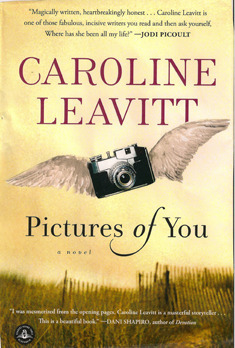 Pictures of You by Caroline Leavitt achieves what it sets out to do, and that’s really all you can ask of a book. It doesn’t strike me as being great literature, but it tells a moving story and it tells it well. There’s a bit too much crying for my taste, but . . .
Pictures of You by Caroline Leavitt achieves what it sets out to do, and that’s really all you can ask of a book. It doesn’t strike me as being great literature, but it tells a moving story and it tells it well. There’s a bit too much crying for my taste, but . . .
The story is about Isabelle who leaves her husband on the Cape when she discovers he’s cheating on her. She’s headed to New York but gets off the highway and is involved in an accident that kills April and puts April’s son Sam in the hospital. Naturally, Isabelle feels terrible about this, even though it’s not her fault. Meanwhile, it isn’t clear why April was there, a couple of hours away from her home. And significantly, Sam, who is nine, thinks Isabelle is an angel who will help him get to talk to his mother. Eventually, Isabelle gets to know Sam and his father Charlie, and she becomes close with both of them . . .
From that point on the story takes some twists that made it more interesting, but it’s still, basically, about relationships and the illusions that we have about them. Sometimes we see what’s in the picture, but sometimes we don’t. It’s a quick, pleasant read.

2013 Reading: Why Zebras Don’t Get Ulcers by Robert Sapolsky
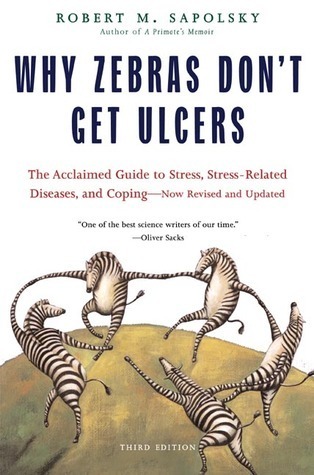 Why Zebras Don’t Get Ulcers, Third Edition by Robert Sapolsky.
Why Zebras Don’t Get Ulcers, Third Edition by Robert Sapolsky.
This might seem like an odd choice for me, but it was book club’s selection for January. (Reading Liberally usually reads more political or policy-oriented books, but we’re both democratic and Democratic, and this one was proposed by one of our members.)
Sapolsky, in excruciating scientific detail, how stress is bad for us. That’s the first 400 pages. In the last 10 pages or so he gives some tips for managing stress, which are mostly pretty obvious: exercise, meditate, make friends, take more control of your life, etc.
Not really very enlightening unless you feel a need to understand the biology of stress.
Guest Post: Midge Raymond
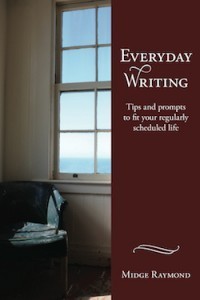 5 Ways to Write When You’re Not Really Writing
5 Ways to Write When You’re Not Really Writing
We are often told that, as writers, we are supposed to sit down in a chair to write every single day. This advice is so ubiquitous that it’s hard to feel like a “real writer” if you skip a day of writing or if your day job allows for writing time only on weekends.
I’m not one of those writers who sits down to write every day—far from it. Yet, having juggled my writing with the rest of life for so long, I’ve learned that I can still be an everyday writer even when I don’t actually write every single day. Being a writer is not just about writing every day (anyone can sit down and type, after all), but it’s about thinking like a writer; it’s about how you see the world, not in how many words you type on any given day.
I’ll never be one of those writers who has the luxury of several hours every day to write (and I’m guessing that, with the exception of a lucky few, most writers out there don’t have this luxury either). So I focus instead on how to make the most of the time I do have—to stay inspired, to gather material, and to get the words on the page whenever I can.
Below are a few seemingly simple (and very effective) tips for how to write when you’re not really writing. For me, following these tips has led to new stories, excellent revisions, and a brand-new project I’m working on right now.
1. Become a better observer. I always thought I was a keen observer of details, until one day when I was in the park with my husband and saw a trio of young men pass by. As they walked away, my husband commented on the fact that one of them was carrying a gun, which I hadn’t even noticed; another man nearby had seen it too, so it was apparently very obvious. At that moment, I realized that there’s a great deal of life that I’m probably missing out on by not opening my eyes and ears enough—and ever since that moment, I’ve been paying closer attention. The more you see, the more material you’ll find, whether it provides a detail for a character description or a storyline for a new project or a spark for a poem or essay. So pay attention, especially during the moments in which you’re usually bored (in line at the post office, for example, or waiting for your turn at the DMV)—and you’ll see that there’s a lot out there for your writer self to enjoy.
2. Listen up. While you once may have been told it’s not polite to eavesdrop, if you’re a writer, all bets are off: Listen to everything. The nice thing about listening is that you can do it anywhere: in line at the grocery store, in the crowd of students while you’re waiting to pick up your own kid, and so on. You may also find that once you begin to listen more closely, your own conversations become deeper, more layered, and more interesting. The point, of course, is not to steal from others’ conversations but to let these overheard snippets spark your own creativity, whether they inspire a new scene of dialogue or give you a glimpse into your own past that you can work into an essay or memoir.
3. Develop habits. Figure out where you do have a little extra time in your schedule. Can you skimp on a few household duties and still keep the place running? Probably. Can you give up an episode of Downton Abbey for some writing time instead? Maybe (well, maybe not). Can you trade an hour on Facebook for an hour of writing? Definitely. It’s amazing how much time we waste without even realizing it; figure out where your “lost time” is going and reclaim it for creative work.
4. Get in—and stay in—a writerly frame of mind. Multitasking seems to have become a necessary evil, yet there are definitely times when it works to the advantage of the busy writer. When you’re at the gym or out for a run, instead of listening to music, think about your characters; write the next scene in your head. If you’re stuck in traffic, turn off the radio and plot out the next chapter of your novel, or start a poem. These small moments of downtime and idle time can really add up—and if you fill them with thoughts about your writing projects, you’ll see your projects moving forward more briskly than you’d expect.
5. Always (always!) carry a notebook. This goes hand-in-hand with paying attention; even now that I notice more of what’s going on in my world, not much sticks in my brain unless I write it down. I carry little notebooks everywhere I go—and if I’m ever without one, I’ll send an email to myself from my cell phone. Then, eventually, I’ll drag my notebook from the bottom of my handbag and find notes I’d completely forgotten about—and I’m so grateful to have them. Get in the habit of doing this so you won’t lose all the little treasures you pick up in your regularly scheduled life.
Midge Raymond is the author of Everyday Writing: Tips and Prompts To Fit Your Regularly Scheduled Life and the short story collection Forgetting English, which received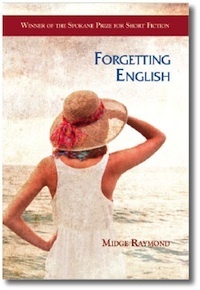 the Spokane Prize for Short Fiction. Her stories have appeared in TriQuarterly, American Literary Review, Indiana Review, North American Review, Bellevue Literary Review, the Los Angeles Times magazine, and many other publications. Her work has received several Pushcart Prize nominations and received an Artist Trust/Washington State Arts Commission Fellowship.
the Spokane Prize for Short Fiction. Her stories have appeared in TriQuarterly, American Literary Review, Indiana Review, North American Review, Bellevue Literary Review, the Los Angeles Times magazine, and many other publications. Her work has received several Pushcart Prize nominations and received an Artist Trust/Washington State Arts Commission Fellowship.
January 22, 2013
Prime Number Magazine Issue 31
 The latest issue of Prime Number Magazine just went live! I hope you’ll check out our Issue 31, which features all kinds of good stuff.
The latest issue of Prime Number Magazine just went live! I hope you’ll check out our Issue 31, which features all kinds of good stuff.
We’ve got fiction by Sharon Harrigan, Christine Jennings, Charlene Pollano, and Mickey Laurence Cohen; essays by Jay Kauffman, Jacob Allgeier, Ray Scanlon, and Christine Hale; a craft essay by Mary Akers; poetry by Simon Perchik, John McDermott, Scott Ward, and Jason Braun; reviews of books by David Foster Wallace and David Ebenbach; and an interview with Amanda Coplin.
Do take a look, please!
2013 Reading — the pile grows
 I have so many books to read in the next couple of months that I had to make a list. It’s a little like being back in school.
I have so many books to read in the next couple of months that I had to make a list. It’s a little like being back in school.
I’m in a couple of discussion groups/book clubs, so there’s that. Our January book for Reading Liberally is Why Zebras Don’t Get Ulcers by Robert Sapolsky and for February we’re reading Twilight of the Elites by Christopher Hayes. Partners on the Path is reading Louise Erdrich’s The Round House for February. (I’m not even sure what the March selections are, but I better find out so I can add them to the list.)
The Virginia Festival of the Book is the third week of March and I’m moderating one panel and sitting on two others. I need to read the books for the one I’m moderating, definitely, so my stack includes Hemingway’s Girl by Erika Robuck, Wash by Margaret Wrinkle, Life Among Giants by Bill Roorbach, and Cascade by Maryanne O’Hara. I’d also like to read the books for the short story panel I’m on (other than my own, of course), so I’ve picked up Robert Day’s Where I Am Now, Kurt Rheinheimer’s Finding Grace, and E.J. Levy’s Love, in Theory. I’m also on a panel that is kind of a mixed bag–it’s about family in fiction but it’s also about Amy Tan’s The Joy Luck Club. So, I need to re-read that, but I’d also like to read some, if not all, of the books by the other panelists, and I’ve picked up Shine, Shine, Shine by Lydia Netzer and Scrapped by Mollie Cox Bryan.
That takes care of March, but in early April there’s more coming. I’m going to a seminar with Jennifer Egan, so I’d like to get A Visit from the Good Squad read. And Robert Goolrick is coming to town to give a reading right after that and I’d like to have read A Reliable Wife (which I have) and maybe his more recent book, Heading Out to Wonderland, which I don’t.
Good luck to me.
January 21, 2013
The New Yorker: “Mayfly” by Kevin Canty
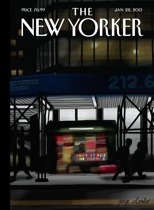 January 28, 2013: “Mayfly” by Kevin Canty
January 28, 2013: “Mayfly” by Kevin Canty
The Q&A with Kevin Canty won’t be terribly helpful to access this story, but there it is. I hate to say it, but this doesn’t seem like a terribly inspired story, to me. It begins well. James and his girlfriend Molly are driving toward the home of some friends and run into a cloud of migrating butterflies. Molly is upset by this and doesn’t want James to go on. (Molly is an interesting but unsympathetic character—she’s a vegan who has given up drinking, but she smokes and doesn’t have much empathy for James’s teaching load, plus she’s just lost her job and is unemployable.) They arrive at the home of Sam and Jenny—a day before they’re expected, because Sam seems to have gotten this wrong. Sam and Molly drive off to Denver, leaving James alone with Jenny, giving her a chance to reveal that the marriage is in trouble and Sam can’t be trusted. With James already having doubts about marrying Molly, this bad news about a marriage he thought was solid is unsettling. With everything falling apart anyway, he and Jenny have sex.
Huh? And what’s that got to do with the butterflies? I suppose we can concoct some kind of connection—the fragility of life, of marriage, is like a butterfly crushed on the windshield? But it seems pretty forced, to me.
The best part of the story is when James goes fly fishing. We should have had more of that.
January 20, 2013
2013 Reading: The Antelope Wife by Louise Erdrich
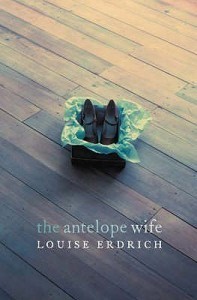 The Antelope Wife by Louise Erdrich has changed my mind about this author. A few years ago, I read another of her novels and found it overwritten and boring. But I was recently given a copy of this book on tape, so I decided to give her another try. (Plus, one of my book clubs is reading her National Book Award-winning novel The Round House, so I’ll be diving into that one shortly.)
The Antelope Wife by Louise Erdrich has changed my mind about this author. A few years ago, I read another of her novels and found it overwritten and boring. But I was recently given a copy of this book on tape, so I decided to give her another try. (Plus, one of my book clubs is reading her National Book Award-winning novel The Round House, so I’ll be diving into that one shortly.)
This book is beautifully written. It’s not without flaws, and the fragmented and convoluted story is a bit hard to follow at times, but the language was worth every minute of the reading.
It’s essentially the story of a couple of commingled families, part Ojibwe, part “white,” part other things, told in many pieces that mostly fit together. There are some real characters in this bunch, including brothers Frank and Klaus, Frank’s rival Richard, Richard’s wife Rosen and their daughter, Cali, Cali’s grandmother, and various uncles, aunts, and cousins. Part of the story is even told from the point of view of a dog, Almost Soup (so named because he was almost soup until he used his puppy wiles to charm a little girl into rescuing him).
I’m looking forward to The Round House.
2013 Reading: How to Write a Sentence by Stanley Fish
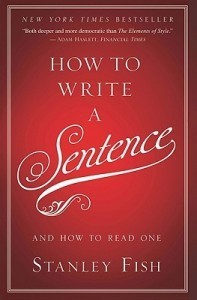 How to Write a Sentence: And How to Read One by Stanley Fish: The book isn’t nearly as enlightening as I’d hoped. At the outset, Fish dismisses the jargon of linguistics but simply substitutes his own. I’m learning far more from a much more difficult but substantial book on language than I did from this one. Of course, for a writer, it is often interesting to see examples of the good and the bad drawn from published work, but Fish could have chosen more modern authors—he doesn’t seem to get much past Gertrude Stein—to be more appealing and relevant to writers.
How to Write a Sentence: And How to Read One by Stanley Fish: The book isn’t nearly as enlightening as I’d hoped. At the outset, Fish dismisses the jargon of linguistics but simply substitutes his own. I’m learning far more from a much more difficult but substantial book on language than I did from this one. Of course, for a writer, it is often interesting to see examples of the good and the bad drawn from published work, but Fish could have chosen more modern authors—he doesn’t seem to get much past Gertrude Stein—to be more appealing and relevant to writers.
I suppose if I were still teaching Freshman composition, some of the ideas articulated in the book might be useful. Fortunately for me, I’m not.
On the other hand–and I’m not sure this was a function of reading the book or simply the fact that I’m in the early stages of writing my new novel–I do find myself thinking more and more about sentences. So I’m not sorry that I read Fish.



